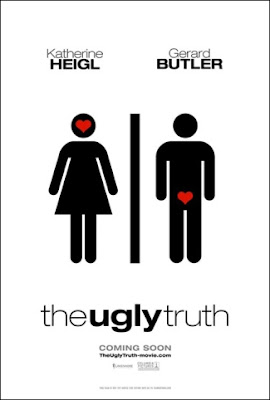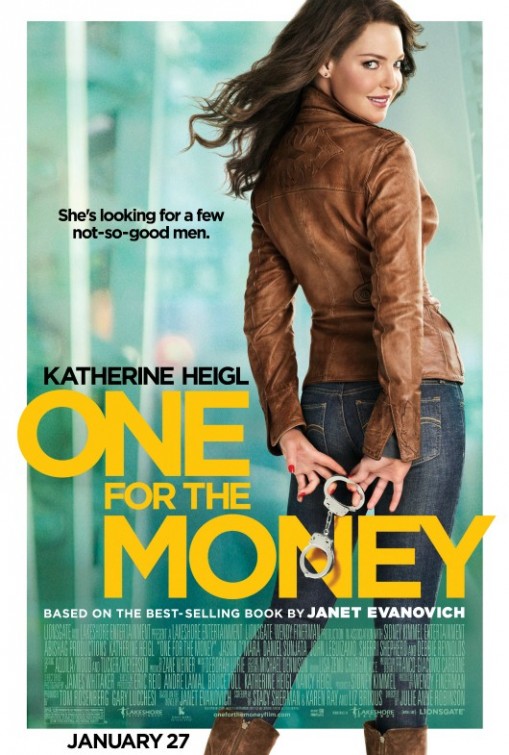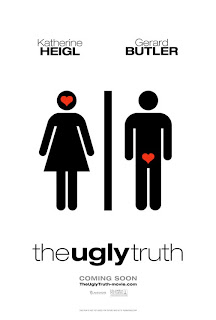 |
| One for the Money (2012) |
When I asked my friend to see One for the Money with me, I warned her that critics had not been kind — as of then it had a 0% on Rotten Tomatoes. That’s right, ZERO critics thought it was worth seeing.
 |
| Wow, up to a whole three percent! |
Why are we seeing it, then?” she asked. “Because the audience liked it.” I told her, “and I don’t fucking care what the critics think because they’re sexist morons about this stuff. Also, we are supporting a female-directed, female-authored movie on an opening weekend.”
Actually, it’s amazing I knew about the movie at all, given how little it had marketed. But I’d been watching Roseanne reruns on Oxygen at the gym and, seeing some ads, I thought it looked fun. It was fun. I would even go so far as to it was “pretty good,” given its clearly limited budget. Not mind-blowing. Not Oscar material. Not Great Art. But well-executed for its genre. Okay, so what’s the dealio with the critical vitriol?
The movie became an excuse for yet another round of Katherine Heigl bashing, including reviews that complained about her being “annoying.” Way to be objective, critics! Now, a few admissions are in order. First, I’ve never read any of the Janet Evanovich books the movie is based on, or been to Trenton, New Jersey. I can’t tell you anything about how accurate the movie is in regard to either, and I don’t really care. I was just looking for an amusing hour and a half, and that’s exactly what I got. The opening title sequence was unappealing, like Sex and the City had thrown up on a James Bond montage : lipstick being shot out of guns and stilettos superimposed over money and such. I didn’t like it, wondered if that was something to do with the book’s aesthetics, and worried that I’d made a terrible mistake.
As the movie progressed, the worst criticism I could come up with was that it was a little dated, with family comedy strongly reminiscent of an Everybody Loves Raymond episode. But Debbie Reynolds was funny as Stephanie Plum’s Grandma, so whatever. And you know what? I started to enjoy the absence of über-irony at every turn. I liked that this wasn’t some unbelievably slick production where everybody lives in patently unaffordable apartments. I loved that Stephanie Plum had a shitty place with a bathroom cabinet that could only hold a single stick of deoderant. I particularly enjoyed the fact that I didn’t have to look at any breasts, but the mancake/suspect dude Plum was chasing took off his shirt. Thumbs way up!
As for Katherine Heigl as Stephanie Plum, she was fine. I repeat, fine. This was never going to be an Oscar-winning performance, but I thought she did a creditable job portraying Plum’s transformation from rookie bounty hunter to tough professional. The mancake dude was good, too, playing it impressively abrasive at first, but letting us (and Stephanie) warm up to him. And there was a cute sidekick guy who showed her the ropes. All fine. A little pat? Sure, but I’m betting the books were too. Such is the genre. In all honesty, I’m still trying to figure out what, exactly, set the critics off. Is it because once she’s got her act together, Stephanie Plum shoots someone, unapologetically? Or because, if she’s going to do that, she’s supposed to be scantily clad and ready for sex at any moment, a la Angelina Jolie in any action flick? But in addition to not taking off her shirt, she also doesn’t squeal cutely while she’s learning to shoot, or do any of the other things women in “chick” flicks are supposed to do. And Plum needs the money, so she turns the suspect in at the end instead of sleeping with him. Maybe, since the movie was fluff, it simply wasn’t airbrushed enough — I mean, we actually see people’s pores! Or maybe, just maybe, it’s because Stephanie Plum is was so much the main character that I can’t really remember the other dudes’ names? No, really, somebody tell me what was so objectionable, without
whining about predictability or how “annoying” Katherine Heigl is.
Now, of course, feminists are apt to look to indie flicks for progress, and that’s fair enough; however, popular movies are an important litmus test, too, because, like advertising, Hollywood has enormous budgets that create an enormous influence on society’s gender perceptions. If the movie didn’t get a decent marketing budget, or have production values as slick as (e.g.) RED, or produce the strong opening weekend an action movie would have, it’s still fair to ask how and why and gender and genre play into that. The answer, I suspect, is because it wasn’t an action movie, by traditional standards. Had it been the “chick” flick it was advertised as, I think the critics were fully prepared to bash it anyway (cf. the ridiculous scapegoating of Bride Wars) but I think the movie had it worse, because it didn’t act enough like a “chick” flick. Look, if you don’t like pat genre movies, nobody’s going to force you to see them – unless you’re a critic, in which case, I defy you to look me in the eye and tell me that this movie was worse than any other mainstream action-comedy out there. If this had been Bruce Willis and not Katherine Heigl, I suspect the critics would have been willing to put up with all manner of unbelievable crap – oh, look, they already are! Female-centered movies like this one get bashed enthusiastically, while (e.g.) the fourth installment of the Indiana Jones series – which was actually BAD in most respects – gets kind of a shrug/free pass from critics. Yeah, okay, now they’re willing to have low expectations. Or maybe the explosions counted towards artistic merit.
 |
| Disagree. |
If you go around demanding that everything in life be Great Art, you’re going to make yourself miserable anyway. But if you claim that’s what you’re doing, and then inconsistently apply the standards, you’re also a hypocrite and, in this case, a sexist twit. A lot of people took it badly that this movie wasn’t pre-screened for critics. But I don’t blame them one bit. Without a big-name male star, the movie was bound to get exactly the treatment it did anyway. But if the definition of equality is that mediocre women’s movies get the same treatment as mediocre men’s movies, we’ve still got a long way to go, baby.
Amanda Krauss is a former professor and current writer/speaker/humor theorist. From 2005-2010 she taught courses on gender, culture, and the history of comedy at Vanderbilt University, and in 2010 was invited to present a course entitled “Humor, Ancient to Modern” at the Osher Lifelong Learning Institute. While she is focusing on her current blog (Worst Professor Ever, which satirically chronicles issues of education and lifelong learning) some of her theoretical archives can be found at risatrix.com.


 Check out Shakesville for a discussion of the increasing number of embarrassing romantic comedies that continue to rehash the same stereotypical anti-woman crap Hollywood’s been dishing out for … ever?
Check out Shakesville for a discussion of the increasing number of embarrassing romantic comedies that continue to rehash the same stereotypical anti-woman crap Hollywood’s been dishing out for … ever?



